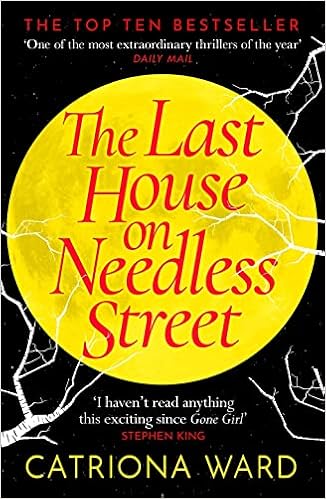The Last House On Needless Street by Catriona Ward
In many ways, the plot seems like that of a modern, edgy thriller: some years ago, a small child called Laura disappeared from the lakeside beach on a day trip with her family, and suspicion briefly fell upon awkward, unkempt loner Ted before the investigation moved on. Now, Laura's older sister Dee - now an adult, but still tortured by the knowledge that she was meant to be watching her little sister at the time she disappeared - is carrying out an investigation of her own, and she's convinced that Ted could still be the culprit.
But this is absolutely not a straight crime thriller. First of all, we have multiple narrators - Ted himself, for starters, but more oddly, his cat Olivia, who loves Ted but dislikes his untidiness and heavy drinking and nurtures a crush on a neighbourhood cat she watches from indoors. Ted has a daughter, Lauren, who comes to stay from time to time, but Lauren's behaviour is erratic, volatile and sometimes unkind. In true creepy loner tradition, Ted seems to be in thrall to his late mother, whose disapproval he fears, and of course, we immediately realise that something's up. Is Lauren really Laura, and if so, why is she only an occasional visitor? Why is Olivia so important?
Ted Bannerman's problems are many: he struggles with basic self-care, is socially awkward, and is clearly mentally ill in some way or another. In many ways, he has a childlike innocence and seems more vulnerable than dangerous - he likes feeding wild birds, stands outside the 7-11 hoping people will give him sweets, and happily writes down his 'recipes' for strange meals that most people would find inedible. But he also has a serious alcohol problem, and there's a suggestion that his mother believed him to be psychopathic after an incident in which a school pet is killed. He's extremely wary of prying eyes, lies to his psychotherapist, and creates a dating profile with someone else's photo in order to meet women. Olivia the cat feels trapped in the squalid house and yearns for her freedom, and at one point Ted, in a drunken rage, terrifies her by shaving off half her fur.
The Last House On Needless Street is a masterclass in writing unreliable narrators. Every time we think we know what (or who) we're dealing with, Ward subverts expectations and pulls the rug from under our feet, sometimes with a significant revelation but more often with subtle hints and allusions. This is one of many things that makes this such an unsettling read - this isn't a book of set-piece shocks, but rather one where we're simply never allowed to become comfortable with our own perceptions. We're constantly forced to question our own judgement, which gives this novel a powerful sense of unease.
In common with Ward's previous books, The Last House On Needless Street deals with broken people isolated by trauma and loss: Ted, of course, but also Dee, whose quest to find her missing sister is driven by intense guilt and puts herself and others into dangerous situations. Dee's decisions are often questionable, at best, and it's clear that the police detective still assigned to Laura's case is concerned about Dee's investigative zeal.
The best I can do to compare The Last House On Needless Street to the work of others is to suggest that it's a bit like a collaboration between Gillian Flynn, Shirley Jackson and Edgar Allan Poe, with a touch of Alfred Hitchcock's Psycho. It's certainly sometimes horrific and in many ways profoundly sad, but there's also a thoughtfulness and sensitivity to it, and even moments of warmth and humour, that temper the darkness.
Catriona Ward has gone from strength to strength with her first three novels, and The Last House On Needless Street really is a compelling read. Ward really gets under the skin of her characters, and I also got a strong sense of place from this book too. Overall, it's a creepy, clever and thoroughly immersive read.

Comments
Post a Comment